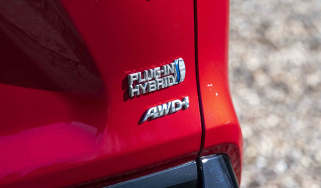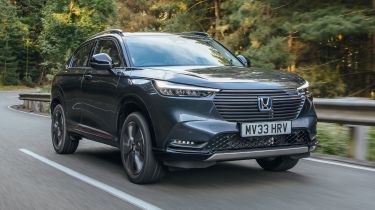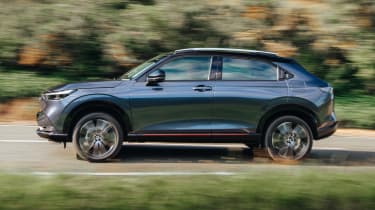New 2021 Honda HR-V: prices and specifications announced
New Honda HR-V hybrid SUV is on sale now for £26,960 and gets a fresh look, updated technology and a 129bhp dual-motor hybrid powertrain
- Available in three trim levels
- Dual-motor e:HEV hybrid powertrain officially returns more than 52mpg
- On sale now from £26,960
UK order books have opened for the new hybrid-only Honda HR-V SUV. Available in three trim levels, the latest HR-V is a direct rival to small SUVs such as the Nissan Juke, Ford Puma, Renault Captur and Skoda Kamiq.
The third-generation HR-V was revealed earlier this year and gets a sleeker exterior design and updated in-car technology. It’s powered by a revised version of the two-motor e:HEV hybrid powertrain already in use in the Honda Jazz, which is capable of 0-62mph in 10.6 seconds and fuel consumption of more than 52mpg in the HR-V.
2021 Honda HR-V hybrid: trim levels, specifications and pricing
The new HR-V hybrid is available in three trim levels. In Elegance guise, the car is equipped with features such as 18-inch alloy wheels, LED headlights, heated front seats and a nine-inch infotainment touchscreen with smartphone connectivity as standard.
The mid-range Advance costs £29,210 and has synthetic leather trim detailing throughout the cabin, a heated steering wheel and a power-operated tailgate. The range-topping Advance Style model, meanwhile, comes with a £31,660 price tag and gets a two-tone paint finish with contrast orange interior detailing, as well as a premium stereo system.
Engine and performance
The new HR-V is powered by a 1.5-litre petrol engine mated to two electric motors and a CVT automatic gearbox. This powertrain is similar to the one used in the current Jazz but features a larger battery mounted under the boot floor. It also produces more power, with a total output of 129bhp. Honda claims this powertrain gets the new HR-V from 0-62mph in 10.6 seconds.
The way Honda’s e:HEV hybrid powertrain operates is unique, with one electric motor powering the car along with the petrol engine. The second motor is connected to the engine but is also used as a generator to charge the car’s onboard battery. This powertrain automatically switches between a trio of modes; ‘Electric Drive’, ‘Hybrid Drive’, and ‘Engine Drive’ to help to maximise efficiency.
There are also three driving modes with the ‘Econ’ setting being the most efficient, which works by limiting the climate control and the car’s acceleration to aid fuel economy. ‘Normal’ mode is the standard setting and ‘Sport’ gives a sharper throttle response. Other fuel saving technology includes energy regeneration, which harvests the energy lost under deceleration and braking and channels it back to the battery. The level of regeneration can be adjusted via the steering wheel mounted shift paddles. Official fuel economy figures for the new HR-V are 52.3mpg and CO2 emissions of 122g/km.
The old HR-V was available with a 1.6-litre diesel engine; this was discontinued in 2020 amid freefalling diesel sales. The new HR-V is part of the brand’s ‘Electric Vision’ strategy, which aims to introduce hybrid or electric power to all of its mainstream models by 2022.
Safety
All versions of the new HR-V come fitted with Honda’s ‘Sensing’ safety suite adding an array of driver assistance technology. A new front camera is fitted, which has more processing power than before and improves both the car’s emergency braking and steering systems.
The new camera is able to better detect pedestrian detection, and is capable of recognising oncoming vehicles including cyclists and motorcycles, automatically applying the brakes when a hazard is detected.
A new adaptive cruise control system is also included, with new advanced software meaning it can perform overtakes when prompted. The system can work out the acceleration and steering angles required to complete a passing maneuver, all with minimal input from the driver.
For the first time in Europe, the new HR-V will also be equipped with Hill Descent Control. This feature can operate at creeping speeds and can help drivers tackle a range of conditions, from slippery inclines to snowy roads.
Interior and technology
Inside, the dashboard has been redesigned with a new minimalist look. A seven-inch instrument cluster sits alongside a nine-inch central infotainment touchscreen, which is mounted to the top of the dashboard. It appears to be running similar software to the system used in the Honda e, and is equipped with sat-nav and smartphone connectivity.
Honda has retained physical rotary dials for the climate controls in a wrap-around centre console with a refreshed gear stick design. The clean dashboard design features an ‘Air Diffusion System’ that replaces the traditional air vents in the centre of the dashboard. This comprises two L-shaped vents mounted by the windscreen pillars, which direct air along the inside the windows to adjust the interior temperature - all without blasting hot or cold air directly at the driver or passenger.
Although the new HR-V is the same length as its predecessor, Honda says that its new powertrain has helped improve the latest model’s interior space. There’s an extra 35mm of legroom for rear-seat passengers, for example, and the rear seats can recline an additional two degrees in comparison to the old model.
The brand’s versatile Magic Seats storage system also features, offering the option to fold the rear seats flat or to flip up the rear seat bases depending on the storage space required.
Design
The new HR-V has a rakish design thanks to a coupe-inspired swooping roofline and a longer bonnet. Despite the sporty profile of the roof, which is 20mm lower than the old car, Honda claims the new HR-V can accommodate four adults in comfort thanks to improved packaging of the hybrid powertrain which results in an extra 35mm of rear legroom.
The front features a new integrated grille and slim LED headlights joined together by a narrow piece of chrome trim. The new HR-V also sits 10mm higher than before, with the sides of the car featuring black plastic body cladding around the arches and sills, together with a high indent line along the length of the car and a flush-fitting rear door handle. Large 18-inch five-spoke two-tone alloy wheels also feature.
The rearmost C-pillar is more sharply angled than before, leading to a new tailgate that houses a slim rear tail light cluster that wraps round from the rear quarter panel across the width of the car.
Read our guide to the best small SUVs you can buy today.
Recommended

Rugged Volvo EX30 Cross Country arrives with £47k price tag

New Land Rover Defender Sport spotted and it’s an electric baby SUV

Petrol and diesel car ban relaxed with hybrids permitted beyond 2030

New Honda Prelude gets Civic-inspired interior in latest pictures
Most Popular

New Smart #5 Brabus is a 637bhp far cry from the brand’s city car past

Best car leasing deals 2025: this week’s top PCH offers
Tips & advice

Car dashboard warning lights: what does each symbol mean?

Electric car charging stations: public networks, charger types, apps and maps












